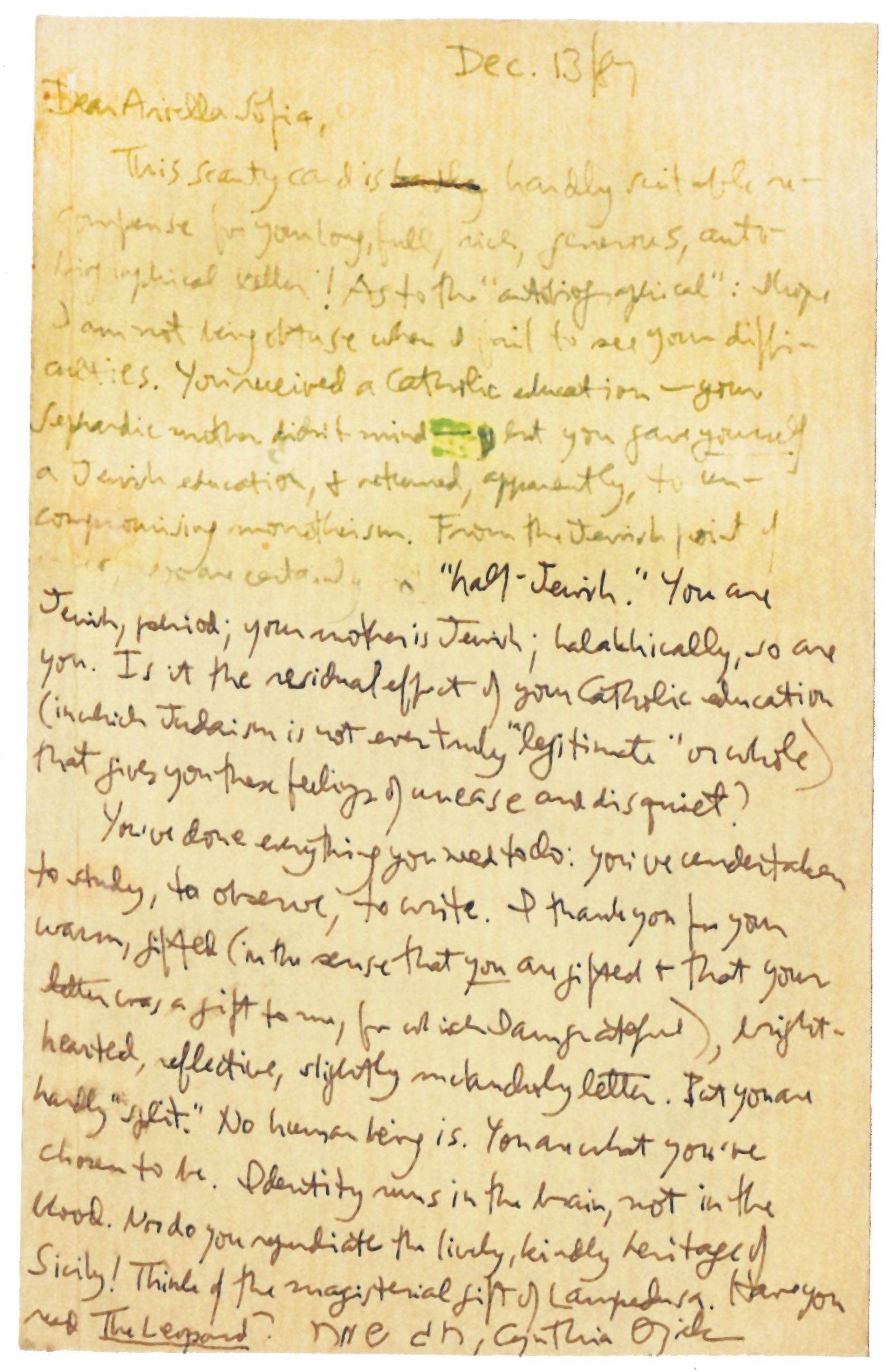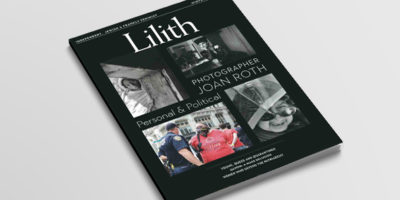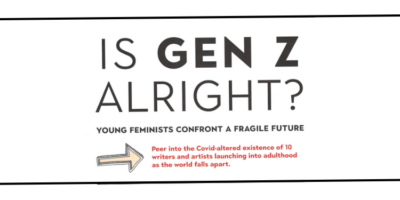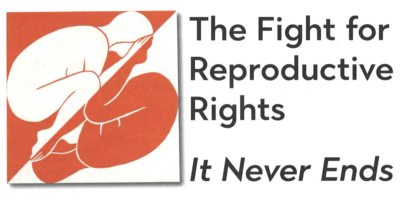
My Secretly Jewish Italian Grandmother
Summer 1959. School is out. Two months to read what I want to read instead of what my teachers tell me to read. A little out of breath, sweaty from peddling my bike a mile back from the library, I am sitting cross-legged on my white chenille bedspread carefully fanning out the books I borrowed today. The plan is to read non-stop and return them all tomorrow, then get some more. My mother’s voice interrupts telling me it’s time to go downstairs to help her mother. I don’t want to stop reading, but I love my grandmother, so I whisper to my new books that I will return soon and stroke the cover of one on the way out of the room.
As usual, when I enter her basement apartment, my grandmother is sitting at a green card table, knitting. Her hands continue to knit even when she looks up and smiles at me. She has turned off her daytime soap opera and already has her box of pale blue stationery and a ballpoint pen set out. It’s the day I am supposed to act as her secretary so she can write letters to old friends who moved away from New York. Except for counting, which she does in Italian, my grandmother speaks English all the time. She thinks I write better in English than she does, however, so this is my new summer job. Dragging a chair over from the dining room, I join her at her table. The clicking of the knitting needles continues.
“Put the date,” she says. I write it and wait, pen poised. “Dear Anna and Axel,” she continues. These are two of my grandfather’s Swedish friends who used to live nearby but moved to Arizona. My pen briefly glides over the paper. Then, silence.
“What do you want me to write, Grandma?” I ask.
“You know,” she answers, sounding a bit irritated. “Like we always do. Tell about the weather.”
Dutifully I write about the nice weather we are having. Every letter she asks me to write starts out the same way. Either we are having good weather, or we are not. Slowly, through question and answer, I draw more information out of her, enough to reach the other side of the paper. I sigh with relief. We are halfway done. My grandmother, who lived through both world wars, does not like to waste things. By her definition, using a second sheet for a letter is wasteful. All I have to do is get a few more comments, enlarge my letters a bit so they take up more room, and we will be finished soon. While she is thinking of what to say next, my mind wonders if I could just rush the project by making up some stories of my own to tell Anna and Axel. Perhaps my grandmother wouldn’t notice.
I look up from the paper to find her studying my face. “Read me what we have so far,” she says.
At her command, I recite.
“That’s enough,” she says. “Put love and sign my name. There’s a stamp in the box.”
Doing as I am told, I carefully fold the letter, a reasonable facsimile of what she dictated, and slip it into its envelope before writing the address. After my grandmother inspects it for accuracy, she lets me lick the stamp and place it on the corner of the sealed envelope. Next comes our little joke. To cure the aftertaste of the glue on the envelope and stamp, she smiles and motions with her head toward the end table where there is a glass bowl full of M&Ms. The candy, she assures me, will take away the taste of the glue.
What’s even better is that now, for maybe fifteen or twenty minutes while my grandfather is in the bedroom finishing his afternoon nap, she will let me ask a few questions about her childhood in Venice. I seem to be the only curious one in the house. Though we bought a home in this town so my family could send me to Catholic school with my cousins—my mother’s sister promised her the nuns would teach me to be a better-behaved girl—what no one in my family knows is that while my mother’s mother and I are alone, she is telling me tales of the Ghetto Vecchio, the old Jewish quarter in Venice, Italy where she was raised as the youngest daughter of Leone Curiel, the father of a large Orthodox Jewish family. This summer day she listens as I practice reciting the Shema in Hebrew—“Hear O Israel, the Lord our God, the Lord is One.” When my grandfather, who has woken up from his nap, enters the room and turns on the television, we stop. My grandmother puts the pen back in the stationery box, replaces the cover, and gets up to put it in a drawer and make coffee for my grandfather. I give her a quick kiss and bound up the stairs toward my bedroom and my books.
Not knowing about the secret conversation, my mother nods in approval as I pass by, satisfied that I have done the appointed letter-writing task.
No one upstairs knows for a long time what actually happens at the end of my visits to the basement apartment. From the beginning I understand without being told that these stories and these prayers are meant only for my grandmother and me and do not tell the rest of my family. That summer and for a long time after, my grandmother and I live a secret life, Marranos in the midst of Long Island, afraid of being caught out in the open by our family.
Growing up with a secret complicates life. In the bible when God asks Adam, Abraham, or Moses, “Where are you?” it seems like a nonsensical question since He presumably knows everything. But the question is not about a geographical location. Instead, God seems to be asking “Where is your soul?” The correct biblical answer is “Hineni—here I am.” The reply must come from a confident, Jewish self, one united with the tribes of Israel. But if God asked me that question in my twenties, I would not have had an answer. I didn’t seem to know. When I was with Jewish friends, their conversation sometimes made me feel like a Catholic outsider, yet when I was with Christian friends, a voice inside told me I was Jewish.
By the time I was approaching my thirtieth birthday, both my father and grandmother had died. Their passing released me to search without guilt for more information about my grandmother’s family and about Judaism in general. I moved to Manhattan, joined a Modern Orthodox synagogue, and started going to adult religious classes. Hebrew was a tough language to learn as an adult, but I managed the long Saturday morning services by listening to the congregants chanting words with the letter lamed inside (ל) that looked like a swimmer in an ocean of words waving at me from far offshore.
In the winter of 1982 when El Al airlines was offering big discounts to coax back ticket buyers after a long strike, I decided to visit Israel. An Orthodox friend fixed me up with his cousin Elisheva who lived on Misgav Ladach, a street within yards of the Western Wall.
One of her sons asked if I would like to go to Sabbath services at a little shtiebel nearby, two rooms sufficient to separate men from women but a space not big enough to be called a synagogue. Alone in the women’s section, I sat on a stone bench as far away from the open doorway as possible. Men’s voices chanting in Hebrew drifted through a curtained window. Shivering with cold and nerves, I picked up a prayer book and tried to join my voice to theirs but felt too frightened to chant. Two figures loomed in the doorway, scaring me until I realized they were just other women arriving to join the service.
Led by the rhythm of the men’s voices in the room behind us, the three of us entered the cadence of the service. As we approached the verses that symbolically welcome the bride of the Sabbath, we stood and turned toward the doorway, ready to bow. Our feminine voices mingled with the crosscurrents in the air: church bells from the Christian quarter, the electronically amplified cries of the muezzins calling worshipers to Allah, masculine voices chanting Hebrew in the room behind us. As the intensity increased, the swell of sound transmuted into a kind of corporeal presence like the floating figures in a Chagall painting. That night it was possible to believe words could create flesh. “Bo-ee callah,” sang our voices as we bowed. “Behold the bride comes.” Raising my head, I peered past the doorway into the dark as if phosphorescent wedding veils, moonlit, shimmering, would flutter into view.
Such a spiritual evening should have solved my identity issues, but it didn’t. The following afternoon, while I was standing inches from the Western Wall trying to say afternoon prayers, a small twig with firm, green leaves suddenly dropped onto the pages of my prayerbook. It had fallen from one of the plants that sprouted in the cracks and crevices of the stone wall. Instead of thinking how miraculous it was that a healthy plant could grow in such inhospitable ground, I found a different metaphor—that twig was me, a living thing seeming to flourish but broken off from its base, so destined to perish. When I returned to New York, it seemed time to admit that I had not gained a real foothold in the Orthodox congregation where I had taken so many classes. I left and moved to Greenwich Village.
Changing neighborhoods, of course, does not solve all life’s problems. They just end up following you. At the time I was a Wall Street securities analyst covering the publishing industry. One day, while reading an interview in Publisher’s Weekly with Cynthia Ozick, an American writer deeply informed not only by classic Jewish thought, but also by the ancient Greeks and Romans, I was struck by her use of the dreaded phrase “half-Jewish” when answering the interviewer. Sleep eluded me that night. Her choice of words made me remember things people had said to me in the Orthodox congregation, even at Shabbat dinners, even though it was forbidden to mention a person’s background if they had not grown up in a traditional Jewish household. Her words stung, so I decided to do something about it.
A week later I was sealing an envelope that contained a short letter questioning her use of “half Jew” and a much longer typed document in which I asked Ozick if she was aware that her protagonist Ruth Puttermesser had gone on an adventure between two paragraphs in one of her published books. Then, I proceeded to tell her what the character had done. Ozick was my senior in age and talent, a brilliant Jewish intellect, and my Puttermesser tale was a kind of fan mail meant to amuse, but also to remove any sting from the first note.
No reply was expected, but some weeks later a 200-word, hand-written postcard arrived with script as tiny as the postcards written by my great-grandfather in Venice to my grandmother when she came to America at the outset of the twentieth century. Ozick was quite generous in her praise of my letter but said she did not understand my position. In a stern but caring voice like my grandmother sometimes used, she emphatically stated that I was not “half-Jewish,” and correctly expressed the idea that no such category existed under traditional Jewish law. One was either Jewish or one was not, in other words. “You are hardly ‘split,’” she wrote. “No human being is. You are what you have chosen to be. Identity runs in the brain, not in the blood.” She ended by asking if I had read Lampedusa’s The Leopard.
This last question showcased why Ozick is considered an intellectual Jewish writer who is also immersed in the non-Jewish world. The novel she had mentioned concerned the Risorgimento, the 19th-century social and political struggle that ended in the consolidation of the separate territories on the Italian peninsula into the unified Kingdom of Italy. What a perfect metaphor to send someone whose life goal was the consolidation of her separate selves!
But then, by accident, by design, by miracle, a second metaphor made itself apparent. Ozick had started out writing the postcard with a green ballpoint. Virtually halfway through—right before the word “half-Jewish”—the pen had run out of ink and she had changed to a much darker tone. Though expressing a single message, the postcard was visually split in half. More than thirty years later, I still smile when reading the card because it became the metaphor that finally and irrevocably glued me together: I am a single sentence written in two colors. It was a grand, if paradoxical, sentiment that any hyphenated American would appreciate.
Sixty years after that summer as my grandmother’s amanuensis, now an old woman and grandmother myself, thanks to Cynthia Ozick I can whisper whole-heartedly when called to read the Torah in my congregation: Hineni.
Carolyn Ariella Sofia teaches writing at Stony Brook University. She is working on a memoir about meeting Polish-American novelist Jerzy Kosinski.




